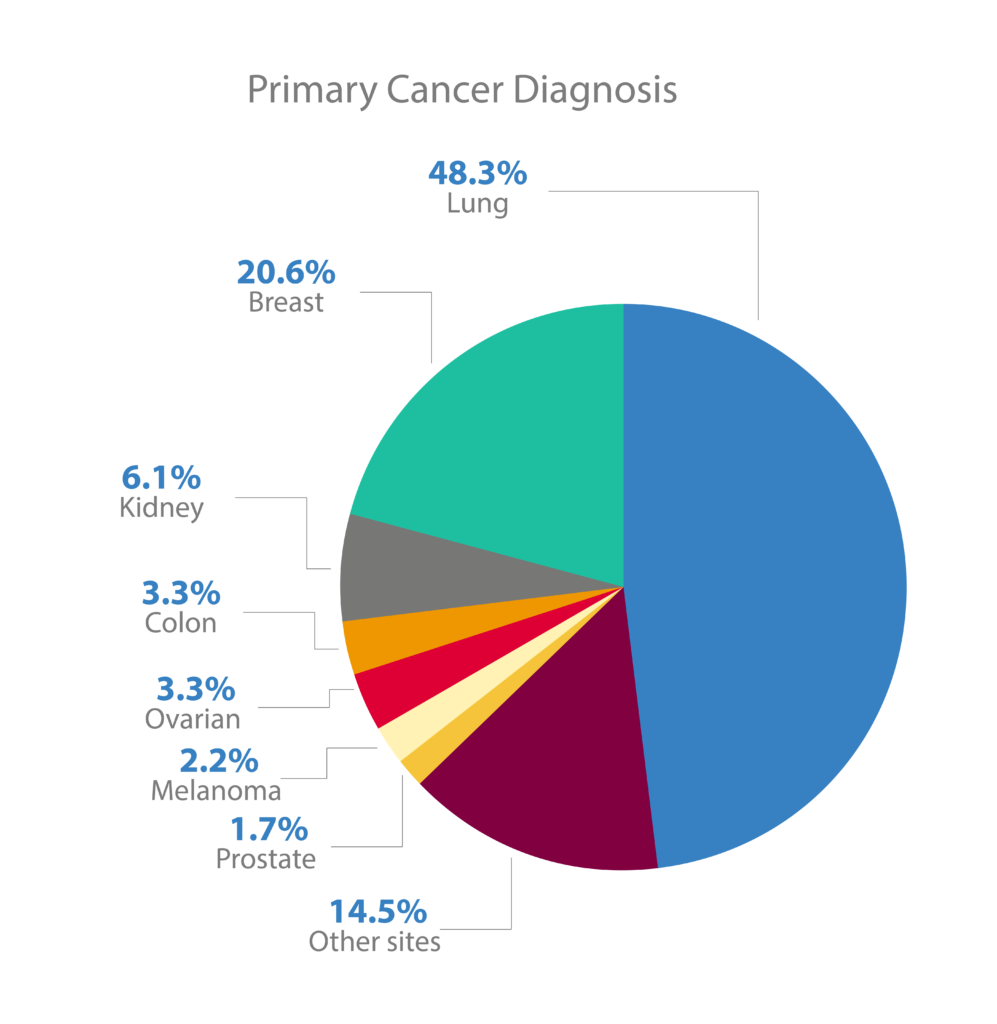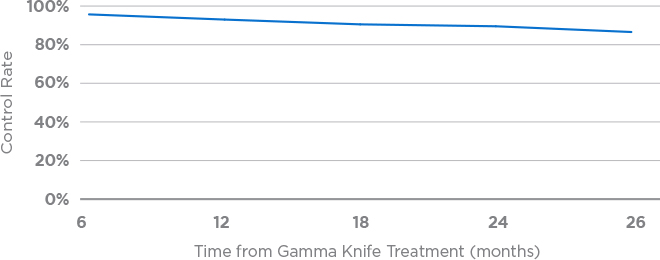Brain Metastases
Table of Contents
About Brain Metastases
Metastatic brain cancer is a tumor made up of cells that have spread from another cancer elsewhere in the body. Even though it does not originate in the brain, it is the most common form of brain cancer. Not all patients with brain metastases will experience symptoms, but those who do are experiencing the tumor putting pressure on specific areas of the brain. With current technologies and treatment strategies, treatment of brain metastases can be very successful. Brain metastases can be treated using stereotactic radiosurgery at a Gamma Knife center, whole brain radiation therapy, open surgery and sometimes chemotherapy.
Brain Metastases Development
Brain metastases originate at another cancer site within the body, then spread by the bloodstream or lymphatics system. Most brain metastases stem from lung cancer, but other possible origin sites include the breast, melanoma (skin), renal (kidney) and GI (gastrointestinal tumors like colon cancer). Treatment options will depend on the origin of cancer, as different tissue cells will respond better to some therapies over others, but the treatment of brain metastases will require some form of radiation with or without surgery.
Symptoms and Diagnosis of Brain Metastases
Brain metastases symptoms are a result of the pressure the tumor is putting on the brain. Though not all patients will experience symptoms, the possibilities include:
- Headaches
- Nausea and/or vomiting
- Seizures
- Vision difficulties
- Weakness, difficulty moving and/or paralysis
- Cognitive impairment (speech, focus, memory)
- Fatigue
To confirm brain metastases diagnosis, a doctor may order diagnostic imaging to visualize the tumor. Primarily, magnetic resonance imaging (MRI) is used, but in some cases, a doctor may collect computed tomography (CT), or positron emission tomography (PET) scans. Surgical biopsy or surgical resection is sometimes necessary to determine the tumor’s origin, which can influence the treatment path.
Treatment of Brain Metastases
The appropriate brain metastases treatment may vary depending on the individual. Much depends on one’s overall health, age, size, location and grade of the tumor. Potential treatments include:
- Stereotactic Radiosurgery: This procedure utilizes state-of-the-art technology (such as Leksell Gamma Knife®Icon™), in which a focused beam of radiation targets the tumor directly, sparing surrounding healthy tissue.
- Whole Brain Radiation Therapy: This therapy delivers low doses of radiation to the entire brain in multiple sessions, and may harm non-cancerous surrounding areas.
- Open Surgery: In some cases, resection is recommended for large tumors and tumors in non-eloquent areas of the brain (areas that don’t impact linguistic ability, vision, movement, etc).
Outcomes for Brain Metastases
At the Valley Gamma Knife Center, we have successfully treated more than 780 tumors since opening our doors in 2011. Brain tumor patients represent the largest group of patients that we treat.


The majority of our metastatic brain tumor patients suffer from lung and breast cancer.
High-functioning patients with multiple brain lesions are often excellent candidates for Gamma Knife treatment. More than 50% of our patients had more than one lesion treated in a single session.


We are proud to report superior local control rates with Gamma Knife treatment. Local control is defined as a measure of how well a treatment method works to treat a particular lesion. At The Valley Gamma Knife Center, more than 90% of lesions were successfully treated after 12 months. At 24 months after treatment, approximately 90% of lesions were successfully treated.
Anthony D’Ambrosio, M.D., M.B.A., F.A.A.N.S
Get Your Questions Answered, By a Real Person.
Our Patient Liaisons are here to help you understand your next step. After discussing your specific case, they can help you navigate your medical records, answer insurance questions, and connect you with one of our nurses, at no charge to you.
For your convenience and safety, we offer both virtual and in-person consultations.


